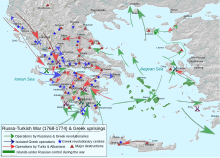Orlov Revolt
| Orlov Revolt | |||||||
|---|---|---|---|---|---|---|---|
| Part of the Russo-Turkish War | |||||||
 Major Greek-Russian (in green), isolated Greek (in blue) and Ottoman (in red) military developments |
|||||||
|
|||||||
| Belligerents | |||||||
|
Greeks |
|
||||||
| Commanders and leaders | |||||||
|
Panagiotis Benakis Daskalogiannis † |
|||||||
| Units involved | |||||||
| Russian force Greek revolutionaries |
Ottoman Muslim Albanian mercenaries | ||||||
| Strength | |||||||
| 4,000+ | 15,000 Muslim Albanians | ||||||
The Orlov Revolt (Greek: Ορλωφικά, Ορλοφικά, Ορλώφεια) was a Greek uprising in the Peloponnese that broke out following the arrival of Russian admiral Orlov, commander of the Russian navy during the Russo-Turkish War (1768–1774), to the Mani Peninsula. Local Greeks rose up, eventually joined by rebels from neighbouring regions.
The Ottoman Empire had its longest period of peace between 1739 (Treaty of Belgrade) and 1768, when it did not engage any of its European rivals. Europe was caught up in costly and bloody conflicts while the Ottomans stayed out and tended to economy and politics, and rebuilding social and administrative organization. This peaceful period came to an end on 23 October 1768, when war was declared on Russia. Causes were aggressive Russian foreign policy, interference in Crimea (an Ottoman vassal), and the power struggle in Poland-Lithuania. There were insignificant events in 1768–69, as both sides prepared for a long campaign.
Meanwhile, Greek rebels were readied. Wishing to weaken the Ottoman Empire and establish a pro-Russian independent Greek state, Russian emissaries had been sent to Mani in the mid-1760s to make a pact with the strongest local military leaders, and at the same time notable Greeks approached various Russian agents discussing the project for the liberation of Greece. In preparation of war, Russian agents promoted Greek rebellion to support military actions in the north. Russian artillery captain Grigorios Papadopoulos (or Georgios Papasoglu), a Greek, was dispatched to Mani. The organization of the Greek rebellion was put under brothers Grigory and Alexei Orlov. Alexei was the Russian fleet commander.
Some Greek notables joined the Russian side, and promised them men and supplies, while in return they expected massive Russian aid (10,000 soldiers and military equipment). Russia planned to incite Balkan Christians to revolt, and sent agents to Bosnia, Herzegovina, Montenegro, Albania, Crete and the Morea. Another Orlov brother, Fyodor, was sent to coordinate rebels in Morea, deemed the most important strategical area in the Balkans (due to its ports). Russia assembled a war fleet for deployment in the Mediterranean, described as 'one of the most spectacular events of the 18th century', which caught the Ottomans off-guard. The first fleet contingent (out of two) departed in August 1769 and arrived in the Aegean in December. This expedition of four ships, few hundred soldiers and inadequate arms supplies greatly disappointed the Greeks. Nevertheless, combined Russian-Greek forces attempted at a campaign.
...
Wikipedia
